High frequency indicators point towards a sequential pick-up in momentum of India's economic activity during the second half of 2024-25, which is likely to sustain moving forward, according to the latest RBI monthly bulletin.
In a challenging and increasingly uncertain global environment, the Indian economy is poised to sustain its position as the fastest growing major economy during 2025-26 as per the IMF and World Bank estimates of GDP growth of 6.5 per cent and 6.7 per cent, respectively, the report points out.
It further states that the Union Budget 2025-26 prudently balances fiscal consolidation and growth objectives by continued focus on Capex alongside measures to boost household incomes and consumption.
The effective capital expenditure/GDP ratio is budgeted to improve to 4.3 per cent in 2025- 26 from 4.1 per cent in 2024-25 (revised estimate).
Retail inflation moderated to a five-month low of 4.3 per cent in January, mainly due to a sharp decline in vegetable prices driven by the arrival of winter crops in the market, the report states.
High frequency indicators show that the economy is on a path of recovery during H2:2024-25 from the loss of momentum witnessed in H1.
Industrial activity has recorded an improvement over the previous quarter, as reflected in the Purchasing Managers’ Index (PMI) in January.
Pick-up in tractor sales growth, and fuel consumption, and sustained growth in air passenger traffic also point to a recovery in overall momentum, according to the bulletin.
It also highlights that rural demand continues to hold up, buoyed by increasing farm incomes.
In rural areas, sales of Fast-Moving Consumer Good (FMCG) companies grew by 9.9 per cent in Q3:2024-25, much higher than 5.7 per cent in Q2. Urban demand also exhibited a recovery with 5 per cent growth in Q3, being nearly double of 2.6 per cent in the previous quarter.
The enterprise surveys conducted by the Reserve Bank corroborate this assessment. Listed non-government non-financial companies recorded acceleration in sales growth during Q3 as per early results.
On a sequential basis, operating profit margins have also turned out to be higher in line with improved sales growth, according to the report.
It further states that investment intentions of the private sector remained stable, with the total cost of projects sanctioned by banks/financial institutions (FIs) at close to ₹1 lakh crore in Q3:2024-25.
External Commercial Borrowings (ECBs) and Initial Public Offerings (IPOs) for Capex purposes also recorded an uptick during Q3.
Uncertainty surrounding global trade and geopolitical landscape have had a bearing on domestic equity markets. The benchmark and broader markets declined on account of selling pressures from Foreign Portfolio Investors (FPIs) as sentiments remained weak.
The Indian rupee has depreciated in line with other emerging economies, weighed down by the strength of the US dollar.
Strong macroeconomic fundamentals, along with improvements in various measures of external sector vulnerability, have helped India tide over the ongoing wave of global uncertainty, the RBI bulletin points out.
The RBI bulletin also highlights that the US trade policy uncertainty has spiked to levels last seen during the 2019 episode of US-China trade war and restrictive trade policies and fragmentation could lead to a long-term shift in global trade patterns rather than a short-term disruption, and upward pressures on consumer and business costs.
The global economy continues to grow at a steady but moderate pace, with divergent outlook across countries amid rapidly evolving political and technological landscapes.
Financial markets remain on edge on the slowing pace of disinflation and the potential impact of tariffs.
Emerging Market Economies are witnessing selling pressures from FPIs and currency depreciation engendered by a strong US dollar, the bulletin added.

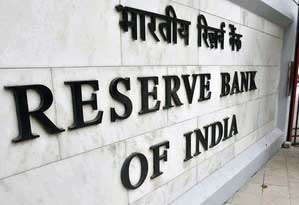
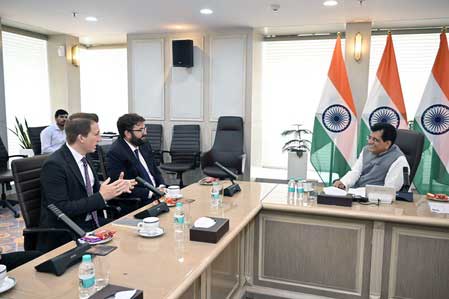
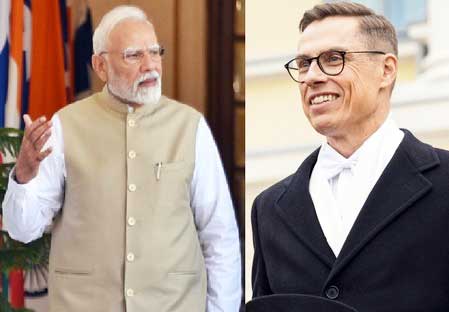
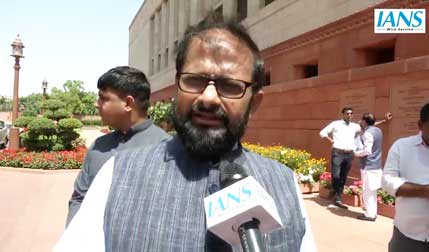
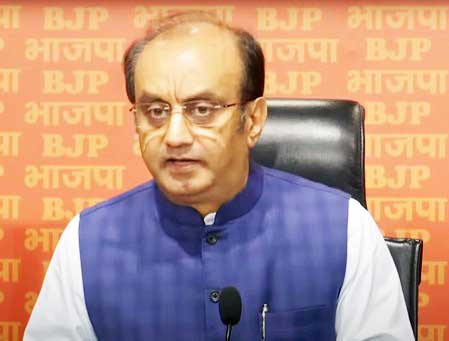
Piyush Goyal meets top execs of Elon Musk's Starlink on firm’s India plans
Commerce and Industry Minister Piyush Goyal held a meeting with top executives of Elon Musk’s Starlink here on Wednesday to discuss the company’s investment plans for India.
Tripura: Two workers killed, two injured after tree collapses
At least two workers, including a woman of MGNREGA, were killed and two more seriously injured when a big tree got uprooted and fell on them in Tripura’s mountainous Dhalai district on Wednesday, officials said.
Finland President dials PM Modi, discusses ongoing collaborations in digitalization, mobility
Prime Minister Narendra Modi and Finland President Alexander Stubb reiterated their commitment to further strengthen and deepen the partnership between the two countries, including in the areas of quantum, 5G-6G, AI and cyber-security during their telephonic conversation, on Wednesday.
Mamata Banerjee’s govt must be dismissed: Shiv Sena on Bengal violence
Shiv Sena MP and Spokesperson Naresh Mhaske on Wednesday launched a fierce attack against West Bengal Chief Minister Mamata Banerjee’s government, demanding the immediate dismissal of her government over its alleged failure to protect Hindus from repeated communal violence.
Herald case: BJP digs out Nehru-Patel's exchange to rebut Cong's charges
BJP MP Sudhanshu Trivedi, addressing a press conference, put up written exchanges between India’s first PM, Nehru and Sardar Patel regarding the Associated Journals Limited (AJL), which controls the National Herald.
National Herald belongs to freedom fighters, not personal property of any family: Rajasthan BJP chief
Rajasthan BJP chief Madan Rathore on Wednesday lashed out at the Congress over the National Herald case, saying that the institution belongs to the freedom fighters, and it is not the personal property of any family.
'Concerned over violence': SC posts further hearing on Waqf (Amendment) Act challenge pleas for tomorrow
During the course of the hearing, the apex court indicated that it would pass an interim order providing that the properties already declared as waqf by court order or otherwise will not be denotified by virtue of the recent amendment.
Were Abdullahs on the same page with PM Modi on Article 370; ex-RAW chief says 'yes'
Former RAW chief, A.S. Dulat in his recent book, ‘The Chief Minister and the Spy’, has generated a storm in the tea cup for the ruling National Conference (NC) in Jammu and Kashmir by writing that the ‘former Chief Minister Dr Farooq Abdullah was secretly on board when Article 370 was removed’.